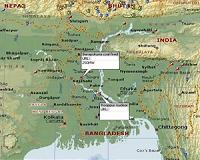 |
Rio De Janeiro (UPI) May 25, 2010 Brazil, the oldest nuclear power in Latin America, is poised to attain industrial autonomy in the processing of uranium in a move pursued by the military to secure the country's pre-eminent status in military and political fields. Brazil completed enrichment on a small non-commercial scale many years ago but faced U.S. intervention in its long-standing nuclear program at every step of the way until the military leaders enlisted Germany as one of the key suppliers. Although U.S. pressure on Germany curtailed some of the technology transfers, Brazil under successive military and civilian administrations pushed forward with a nuclear program that began in the 1930s. A secret weapons development program, started by the military in the early stages but shelved from time to time by successive regimes, remains shrouded in mystery. Brazil has frequently battled with the International Atomic Energy in Vienna to resist inspection of facilities designated as sensitive by the military. News that autonomy on an industrial scale was at hand was broken by military sources quoted in the Brazilian media. The sources said Brazil will be able to control the whole industrial cycle of uranium processing from extraction to conversion to fuel by the end of 2010. Brazilian Navy Capt. Andre Luis Ferreira, coordinator of Brazil's nuclear propulsion program, said completion of the process would free Brazil of dependence on other suppliers -- notably the United States. He revealed Brazil will complete this year the first phase of a plant for the production of uranium hexafluoride, from which enriched uranium is developed. The Aramar plant is located within a military complex in Ipero in the state of Sao Paulo. As part of the plan, residues from the hexafluoride will be further treated several times to minimize environment impact. Brazil's move assures its position as an industrial power but also as a power broker, a role President Luiz Inacio Lula da Silva played amid the glare of global publicity when he helped broker a deal between Iran and Turkey over a nuclear fuel swap. The deal, still subject to IAEA approval, is seen as a compromise aimed at defusing international tensions over Iran's nuclear program. Brazil has stepped ahead of Iran, whose nuclear program it defends, by aiming to become a major nuclear materials producer and exporter in region that sees nuclear power as a future alternative to fossil fuels. Argentina is a close contender as Latin America's second largest nuclear power, and Chile and Venezuela are considering their own nuclear projects with Russian and other technical assistance. Of the four, Brazil is the only Latin American country to be overtly developing a nuclear program that can be adapted to military purposes at short notice. Vice President Jose Alencar publicly defended Brazil's right to develop nuclear weapons as a deterrent to anyone with hostile intent on its territory and offshore hydrocarbon deposits. Brazil operates two nuclear power generation plants in Angra do Reis, Rio de Janeiro state. But they contribute only about 3 percent of electricity to Brazil's grid. Plans call for major electrification expansion throughout Brazil, with nuclear power providing a much greater share. In tandem with non-military nuclear power development, Brazil's navy will build a nuclear processing plant to prepare for the commissioning of the first nuclear-powered submarine, to be built with French help. "The navy's reactor will help as a model for future nuclear plants," Ferreira said. Work on building the submarine will begin in 2016 and completed before launch in 2021, he said.
Share This Article With Planet Earth
Related Links Nuclear Power News - Nuclear Science, Nuclear Technology Powering The World in the 21st Century at Energy-Daily.com
 Bangladesh-Russia sign nuclear power deal
Bangladesh-Russia sign nuclear power dealDhaka, Bangladesh (UPI) May 24, 2010 Bangladesh and Russia signed a framework agreement for Russian cooperation for Bangladesh's first nuclear plant. Bangladesh aims to produce at least 2,000 megawatts of electricity by 2020 from two units of the proposed Rooppur plant and also to have nuclear energy account for 10 percent of its total power generation by that time, Bangladeshi state news agency BSS reports. The agr ... read more |
|
| The content herein, unless otherwise known to be public domain, are Copyright 1995-2010 - SpaceDaily. AFP and UPI Wire Stories are copyright Agence France-Presse and United Press International. ESA Portal Reports are copyright European Space Agency. All NASA sourced material is public domain. Additional copyrights may apply in whole or part to other bona fide parties. Advertising does not imply endorsement,agreement or approval of any opinions, statements or information provided by SpaceDaily on any Web page published or hosted by SpaceDaily. Privacy Statement |